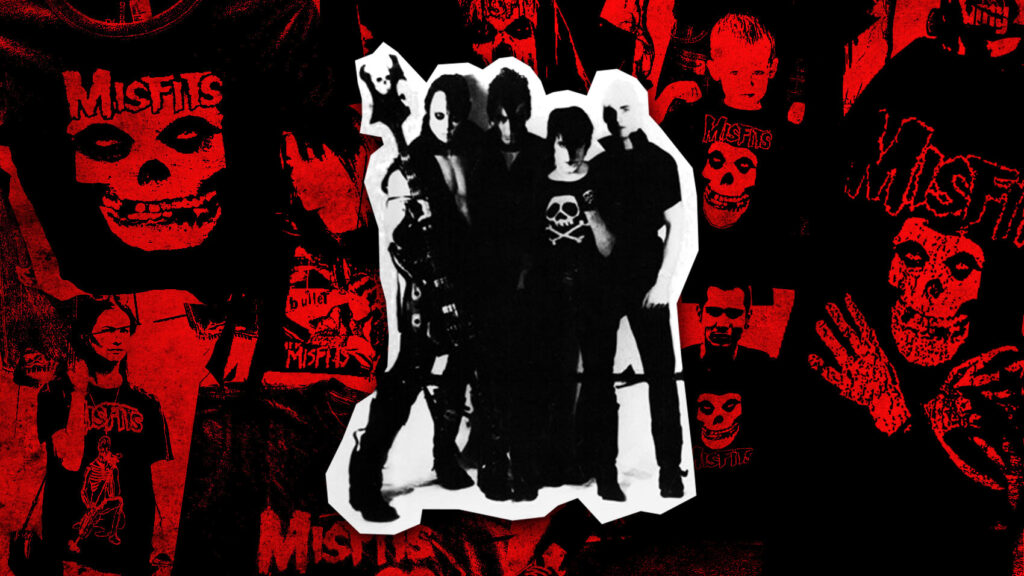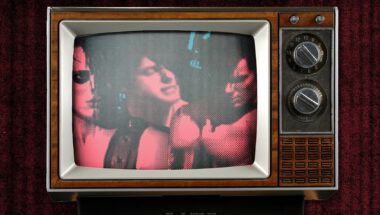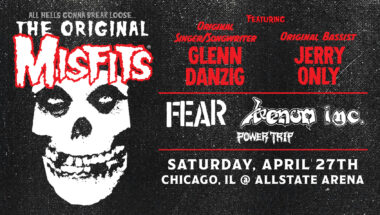When the Misfits first came around, there was nothing in the world like them. The disco and soft rock filling the airwaves at the time was escapist at its core; the Misfits, meanwhile, shoved horrifying visions of violence in your face like a Clockwork Orange torture device. Other punk bands flirted with nihilism, but the Misfits embraced the void with a disturbing enthusiasm, reveling in the gory mayhem. Bruce Springsteen—another New Jerseyan with a girl group obsession, who in some ways was the closest thing going on to the Misfits at the time—was writing songs about the death of the American Dream, while Glenn Danzig and company were poking at its bloated corpse with a pointy stick.
In 1978, the band released the Bullet EP into a world that couldn’t have been less hospitable. Escapist soft rock and disco ruled the airwaves. Watergate and Vietnam were fresh memories, and America hadn’t yet healed from JFK’s assassination just a decade and a half before. Bullet leaps out at the listener’s throat with the opening title track, where Danzig gleefully desecrates the death of America’s last civic saint in forensic detail, casting Jackie O. in a surreal, sadistic psychosexual nightmare that weaves together the Zapruder film and Crowleyan magick with deranged glee. Behind him, the band bashes out a buzzsaw arrangement that sounds like an Everly Brothers rave-up that’s been hacked apart and crudely stitched back together. In the span of a minute and 39 seconds, it violates the modern American mythos more thoroughly and efficiently than any work of art you’ll find in a museum, and will leave you humming it for days.
There’s a gleeful perversity in everything the Misfits did: They idolized Elvis, Marilyn and an earlier generation of pop culture icons, while also ripping open their guts for inspiration. They wrote big pop hooks as catchy as anything that ever came out of the Brill Building, then bathed them in gnarly lo-fi distortion and topped them with some of the bleakest, most intensely nihilistic lyrics in pop history, teeming with soulless psychopaths, extraterrestrial mass murderers, and necrophiles. They even made their obsession with Atomic Age B-movies unsettling, infusing the schlocky source material with a sinister energy that made it legitimately scary, and set it far apart from the campy Eisenhower-era retro revival happening at the same time in the mainstream.
Demonic bubblegum songs about death and dismemberment were a perfectly fitting soundtrack to the Eighties, where America’s nostalgia for the lost innocence of its Leave It To Beaver days collided with an increasingly sociopathic culture where dog-eat-dog individualism and success by any means necessary were becoming enshrined as civic values. The Misfits were never an explicitly political band, the way that a lot of the hardcore acts they fell in with were, but their songs captured every bad vibe in the air during the Reagan era.
Released just over 40 years ago, Walk Among Us is a nightmare thrill ride into the depths of the anxious, alienated American psyche. It opens with a jolt, with a burst of breakneck guitars and drums, and Danzig barking “20 eyes in my head / and they’re all the same,” some kind of mutant freak, warped by our addiction to sensory overload. In the span of 13 songs in under 25 minutes, Danzig casts himself as a zombie, a murdered, a cannibal, and an alien invader. There’s a love song about the B-movie icon Vampira and a love song about the U.S. Army’s Nike missile system.
The mainstream music industry didn’t know what to do with the Misfits, but between word of mouth and copies of Walk Among Us passed hand to hand, they grew into one of the most influential bands in modern music history. Their impact stretched across genre boundaries to shape the sound of punk, hardcore, and metal. By the time the Nineties rolled around and the alt-rock boom went off, the Misfits had become part of the underground canon, as popular with indie rockers and ska fans as they were with full-time punks, even though a lot of their best work wasn’t even in print.
Today the Misfits are more popular and influential than ever, which only makes sense. Their songs still feel razor sharp, and decades of heavy listening haven’t made their hooks any less catchy. Their rawness and massive fuck-you attitude have made the band touchstones from every kind of musician imaginable, from rappers wearing Crimson Ghost t-shirts in their videos to club DJs dropping “Skulls” into their sets.
And if anything their music makes even more sense today than it did in the Eighties. This really is a Static Age, our eyes crisscrossing as we gaze into blue-radiation screens that have infiltrated every corner of our lives. The news is full of apocalyptic scenarios only a little less outrageous than Glenn Danzig’s lyrical visions. Life in 2022 America feels so off-the-rails sometimes that if a bunch of genocidal aliens landed on Earth today and announced their intention to exterminate the whole human race, a lot of us would probably just tweet something snarky about it and go about our day.
But what’s great about the Misfits is that while their best songs are about some of the grimmest shit imaginable, they’re also unrelentingly hopeful. You don’t put the Misfits on to mope about the state of the world. You put them on because their choruses are triumphant three-chord masterpieces that jam a boot heel straight in your adrenal gland. You put them on because they make embracing the void feel like a victory, and having Danzig in your earbuds singing about cold-blooded murder makes you feel tough enough to survive in this fucked-up world. After all, if a bunch of guys from Lodi, New Jersey singing psycho love songs about zombies and ghouls could rise above the odds and the complete indifference of the music biz to become one of the most important bands of all time, there isn’t anything you can’t do.



